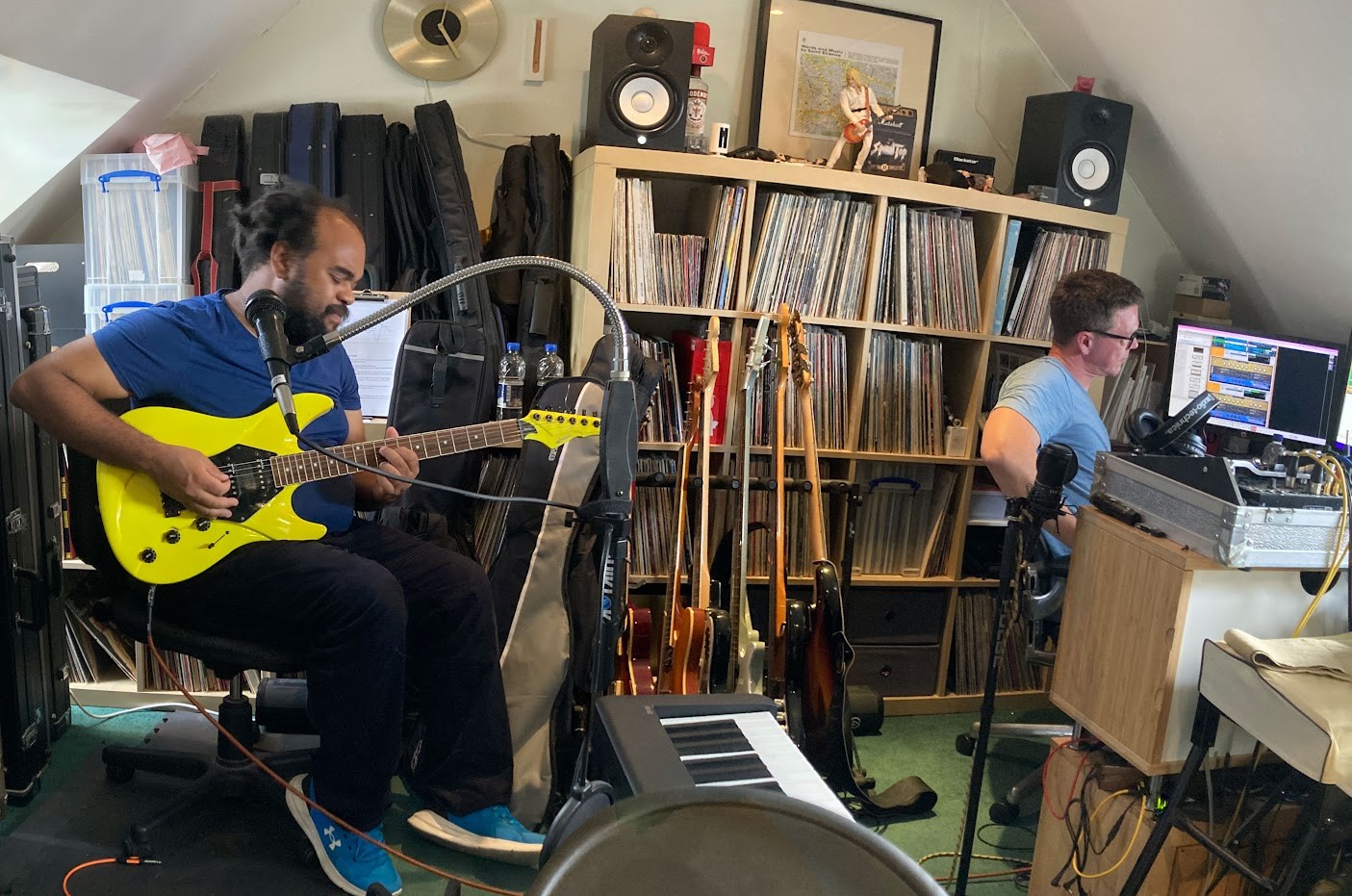Dean Sobers explains The Sighs of Monsters’ unvarnished interpretation of Sparks’ synth pop classic.
It’s a well documented fact that every piece of music recorded in the past 150 years is, at some level, attempting to emulate Sparks. We – my band The Sighs of Monsters – are as guilty of this as anyone else. There’s a song on our new album Present that was clearly devised while the 1983 Sparks album, In Outer Space, was spinning in the proverbial tape player.
In particular, two of Sparks’ songs – ‘Lucky Me, Lucky You’ and ‘Popularity’ – with their naïve-sounding, earworm vocal melodies. I hasten to insist it is influence rather than theft…but I ain’t namin’ our influenced song.
Absent another singer with whom to duet ‘Lucky Me, Lucky You’, we turned to ‘Popularity’ in an attempt to pay our dues to the Brothers Mael. Here’s a bit about what the song says to me, our approach in covering it, and the challenges we faced getting our tribute off the ground.
The Song
Like many songs that I love, there’s mystery to ‘Popularity’. I can’t claim to know what it is ‘really about’. Sparks are one of my favourite bands, but I don’t have a great depth of knowledge of them – and know next to nothing about the circumstances in which ‘Popularity’ was written, or what Russell or Ron have said about it.
But here’s what it depicts: A speaker (we’ll call him – if he’s a man – ‘Russell’) addresses a person with whom he has some degree of romantic involvement. This person seems keen on Russell’s company. But carefree, gregarious Russell’s thoughts seesaw between their intimacy and the joyous prospect of spending time with his friends. He ponders the idea of ‘popularity’.
Russell is fond and affectionate in tone, but his words are all avoidance. He ‘likes’ the person (they like him a lot). He’s ‘so glad’ he met them. Spending time with them is ‘nice’. Meanwhile, there’s this dreamy world he romps around in with his friends – which is shrouded by speculative language and a conspicuous lack of specifics:
‘What a night, we all drive into town
Where we’ll park our cars, and meet the rest of our friends
At a place that’s called- I forget what it’s called
But it’s really great, and all our friends will be there.’
I’ll share six of my running theories as to what’s happening – based on the words as written. These are listed in no particular order. Feel free to add your own hypotheses in the comments.
- Russell is trying to impress the prospective romantic partner. He wants to be seen as a guy who twirls and skates across the Great Roller Boogie Palace of Life. Basically, it’s a social media or dating website profile from 1983.
- Russell is being drawn into an unwanted commitment and is trying to sweet talk his way round it. The ‘friends’ are an excuse who may or might not exist.
- Something about Russell’s potential romance won’t go down well with his peers. It presents a genuine threat to how they’ll think of him and therefore places in jeopardy the ‘popularity’ he’s attained or craves. When he sings that word – repeating it for longer each time he revisits it – we’re hearing fear.
- Russell is sincerely deliberating between the intimacy on offer and his real, cherished time with his friends. He’s wondering which kind of connection he treasures more. Can he have both? Could he sacrifice any part of either?
- Russell is pondering the ideas of personal intimacy and friendship from a more distant vantage point. These things/scenarios are somewhat hypothetical to him – explaining the vagueness. Perhaps neither his friends nor the love interest actually exist – at least not in the idealised forms he’s given them here. But he’s nonetheless absorbed by those ideas. Perhaps he’s fantasising about this dilemma of the enticing intimate relationship versus the vibrant social life. Perhaps in his mind ‘popularity’ exists in place of meaningful human connection.
- Russell is nostalgically recalling to us a time in his life when his personal popularity and social life were at their peak. The lack of clarity or specificity calls into question whether these recollections can be trusted.
Our Reinterpretation
Listening to Sparks’ song, I hear Ron’s deft melodies over breezy synth and, gliding over that, Russell’s languid, smiling croon – both earnest and knowing.
We could have tried for this style in our cover. ‘Popularity’ is one of Sparks’ simpler songs and more straightforward arrangements. We could have executed something quite like what they did – perhaps transposing some of the keyboard sections to guitar to mix things up a bit.
We did something a little different. If you’re taking a swing at some bells-and-whistles opus ([don’t] watch this space for our cover of ‘Dick Around’…), approximating the original’s intricacies is its own accomplishment. But the simplicity of a three-chord wonder like ‘Popularity’ demands it be interpreted.
This raises a basic question: Who’s doing the interpreting? Well, in our case, three middle-aged crazy uncles – one of whom lives alone in an attic – who have spent the past three-or-so years in another attic, cobbling together an indie rock album mostly about loneliness. That’s who.
Also, virtuoso players we ain’t. Don’t get me wrong. We’ve been challenging ourselves in the making of Present to up our game as performers – and we’ve definitely made strides. But none of it comes easily and probably never will. It seemed important that our take on ‘Popularity’ fully embrace this.
No synth. No guitars.
‘No synth, no guitars. Anything else’ was the brief I appended to a wobbly piano demo in an email. This was intended simply as a challenge to keep us thinking – and to not lean on old habits. However, beneath that, I think I wanted us to avoid doing anything that would ‘enhance’ or uplift our version of the song. I wanted our quirks and limitations to keep it weighed down. This is probably because the lyric itself seems to have so much to do with insincerity – of smoothing off rough edges.
Instead of synth we used harmonica. In its way, harmonica performs a similar role as a synth – but it’s not a button you press. I don’t think it relieves tension the way some lush strings might. You can hear the performer struggling with it. Meanwhile, in lieu of a guitar solo we went with some whistling.
Both the harmonica player and the whistler – both somewhat out of their depth – had reservations about allowing their respective performances to survive the mix. At one point, the word ‘dogshit’ may have been used to describe the whistling. But survive, both parts did – in all their unflattering glory.
The Final Result
Looking at what we ended up with and comparing with my earlier list of possible readings of Sparks’ song, I think our cover assumes a bit of 1) – with a dash of 5). Our ‘Russell’ paints a fraudulent picture of himself as a majestic social butterfly – implicitly telling us he’s anything but. Yet, I think our crooner is more fantasist than conman – bewitching himself at least as much as he does any third party. If the original’s ebullience gives wings to his blissful BS, I like to think our heavier-hoofed version is a more neutral, harshly lit rendering of the bullshitter.
Of course, I’ve hopefully made it clear that I don’t think our interpretation holds any more ‘truth’ to it than anyone else’s – and it goes without saying that Sparks’ is definitive. But I think our version reveals something honest about us as musicians, while honouring the cleverness and playfulness of the original.
I realise that in this account, I might have made our cover sound like it’s William Shatner reciting something out of Chekhov. Look. In truth, we put our version of ‘Popularity’ together in less time than it’s taken me to write this blog post, we had a laugh while doing it, and it was goofy and rewarding fun. I’m just trying to be a bit analytical about it in the post-mortem. I hope you’ll have a listen yourself, and let us know if you enjoy what you hear.












